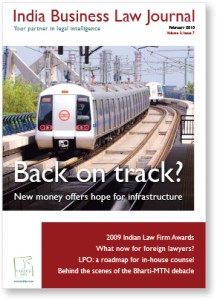‘The patent system added the fuel of interest to the fire of genius.’
So said Abraham Lincoln, the only US president to hold a patent. For modern-day evidence of this, look no further than the interest surrounding the launch of Apple’s iPad. In common with many other innovations, the success of every product that emerges from Apple’s secretive stables relies on the maze of patents, copyrights and trademarks that protect it, and the effectiveness with which they can be enforced.
For international IP owners in India, more effective protection may soon be a reality. Writing in this month’s Vantage point (Putting the house in order, page 28), Simran Daryanani, the India representative of the International Trademark Association, explains why the country’s accession to the Madrid Protocol has been greeted by IP owners as “a beacon of hope”. Daryanani praises the judiciary for its “growing understanding of trademark disputes”, but warns that fundamental improvements must be made to India’s domestic IP infrastructure to give rights owners the robust apparatus they need to protect their innovations.

Confidence is certainly returning among investors and there is cautious optimism about the sector’s prospects. Yet too many investment deals are being thrown off course by regulatory constraints, the lack of attractive financing options and problems relating to land acquisition. Capital, it seems, is only half of the equation. If India’s creaking infrastructure is to receive the comprehensive upgrade it so badly needs, the government must act to smooth the regulatory path for private investors.
In the first of this month’s Spotlight features (What now for foreign law firms?, page 29), we analyse the implications of Bombay High Court’s recent ruling on foreign law firms. The judgment forced the last remaining foreign law firm liaison office to close its doors. It also clarified that foreign lawyers may not practise even non-litigious law in the country.
Despite disappointment in many quarters, the impact of the ruling may be minimal. Trilegal partner Anand Prasad describes it as an “inconvenience rather than a deathblow”. And Neil Torpey, a partner at Paul Hastings, observes that “neither the Advocates Act, nor this judgment, address the issue of non-Indian-law transactional work,” which is what most foreign law firms’ India teams undertake.
With the country’s legislators and policy-makers undecided on whether and when to open up to foreign firms, the game of watch and wait continues.
Our second Spotlight (Venturing out, page 33) warrants the careful scrutiny of every corporation and law firm that may be warming to the idea of legal process outsourcing (LPO). Distinguished commentators Connie Brenton of Sun Microsystems and Mark Ross of Integreon offer practical advice on the key aspects of initiating and managing a successful LPO relationship; from choosing between the mind-boggling array of service providers, to deciding which functions to outsource and designing processes to ensure productivity, value creation and quality.
This month, India Business Law Journal is proud to reveal the winners of the 2009 Indian Law Firm Awards (page 41). Designed to celebrate the innovation and drive that characterizes so many of the country’s lawyers and law firms, the awards are based on an extensive survey of in-house counsel and other legal professionals, both within India and outside.
The top award of law firm of the year goes to Luthra & Luthra, a firm that made huge strides during 2009, both in terms of professional achievements and practice development.
Hot on Luthra’s heels are Amarchand Mangaldas, AZB & Partners, J Sagar Associates, Khaitan & Co and Trilegal, all of which join Luthra & Luthra as winners in the category of best overall law firms. Despite extremely challenging market conditions, all of these firms succeeded in bringing a large number of complex and innovative deals to fruition in 2009.
One deal that did not go according to plan was Bharti Airtel’s merger with South Africa’s MTN. Despite being touted as a market-changing transaction that would create a new breed of multinational company – one that was born and bred in emerging markets – the merger never happened.
In this month’s What’s the deal? (Connection lost, page 38), we revisit the failed transaction and analyse the immense political and regulatory challenges that ultimately proved to be its downfall.
Bharti’s chairman, Sunil Bharti Mittal, had hinted that attempts might be made to revive the deal. But speaking in mid-January, Rajan Mittal, the company’s vice-chairman and managing director, declared: “The MTN chapter is now closed”. Spoken in all seriousness, or will there be more to this interesting saga? Only time will tell.


























